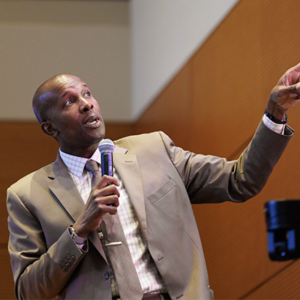Faculty and staff from the Department of Psychiatry & Behavioral Sciences have shared their expertise in this area within and beyond the Duke campus, from penning op-eds to engaging in a range of research and other activities. Below are some highlights of their work.
Tyson Pankey Named Vice Chair for Equity, Diversity & Inclusion
Assistant professor Tyson Pankey, PhD, MPH, has been named vice chair for equity, diversity, and inclusion for the Department of Psychiatry & Behavioral Sciences, effective August 1, 2024. A clinician, researcher, and educator, Pankey specializes in culturally responsive behavioral health and education among minority patients, including those with intersecting cultural identities and backgrounds.
Experts Offer Best Practices for Inclusive Research
Several Duke CTSI experts on best practices for inclusive community-engaged research—including Duke Psychiatry's Dane Whicker, PhD—joined the panel for “Building Inclusion into Research: Language Matters,” a virtual Research Town Hall hosted by the Duke Office of Scientific Integrity.
School of Medicine Celebrates Juneteenth with Keynote by Damon Tweedy
Duke University School of Medicine’s Black employee resource group held its third annual Juneteenth celebration on June 20. The event featured keynote speaker Damon Tweedy, MD, professor of psychiatry and behavioral sciences.
Child Health Equity Pilot Awardees Present Research Projects
Pilot award recipients from the Duke CTSI and Children’s Health & Discovery Initiative (CHDI) Child Health Equity Program, funded by the Translating Duke Health Initiative, presented their research projects during a meeting of the Program’s Advisory Council in May. Duke Psychiatry faculty members John Mitchell, PhD, and Jessica Lunsford-Avery, PhD, were among the presenters.
Alumna Heather Kim: Providing Affirming Care to LGBTQ+ Youth
While a Duke psychiatry resident, Heather Kim, MD, partnered with associate professor Marla Wald, MD, to create a gender care psychiatry elective. Kim is now a psychiatrist at Mass General Hospital whose practice focuses on gender-affirming care.
Towards Equitable Brain Genomics Research, For Us by Us
The increased inclusion of samples from individuals from minoritized communities in biomedical research will help mitigate health disparities that stem from a medical enterprise founded in racism and exclusion. In the May 20, 2024, issue of Nature Neuroscience, Benjamin et al. investigate how genetic ancestry influences the expression of genes in the brain, an effort supported by community leaders who raised funding, partnered in shaping research questions and had a central role in the interpretation and communication of the study’s findings. In this commentary, Duke Psychiatry's Kafui Dzirasa, MD, PhD, and colleagues outline the public and social context that motivated these efforts towards ensuring equitable access to the benefits of science for all.
Black Adults at Risk for Alzheimer’s Disease Live in More Polluted Areas, U.S. Study Finds
A study by Duke and Columbia Universities finds older, non-white adults are more likely to live in areas with higher air pollution and near toxic disposal sites, among other environmental injustices, potentially undermining their cognitive health. Duke Psychiatry's P. Murali Doraiswamy, MBBS, FRCP, was the senior author.
NCCU Students Reflect on Duke Internship Experiences
Three North Carolina Central University (NCCU) students and one UNC-Charlotte student completed internships in Duke Psychiatry & Behavioral Sciences this year as part of the Duke-NCCU Bridge Office Internship Program. The scholars presented on their internship experiences during the program’s closing ceremony in April.
In New Book, Damon Tweedy Explores the Urgent Need to Integrate Physical and Mental Health Care
In his new book, "Facing the Unseen: The Struggle to Center Mental Health in Medicine," Duke Psychiatry's Damon Tweedy, MD, weaves together patient stories, personal reflections, and conversations with experts to explore how medical culture has historically separated physical and mental health, how this dichotomy harms both patients and doctors, and how we can better integrate these two perspectives for a more holistic and effective approach to health and well-being.
Dr. Jane Gagliardi: Championing Civility in Medicine
Jane Gagliardi, MD, MHS, Civility Champion debrief facilitator for the Department of Medicine, is highlighted for her diversity, equity, and inclusion (EDI) advocacy as part of a Women's History Month series. Her journey is not just about advocating for EDI; it's about embodying these principles in every interaction, every decision, and every moment of connection within the health care ecosystem. Dr. Gagliardi is also a Duke Psychiatry faculty member.









